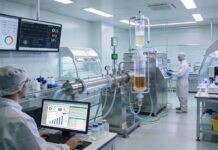The future of medicine, we’re often told, will be personalized. We’ll have gene therapies, wearables to monitor our vital signs—maybe even new kinds of vital signs—and robot doctors to diagnose our illnesses.
But the real promise of personalized medicine is, counterintuitively enough, that it’s not actually just about you. Improving one person’s health care will mean taking what we know about everyone else and feeding that data back into a more personalized system.
If you think about it, that’s how medicine already works. Doctors are trained to recognize how likely it is that an individual’s unique symptoms and characteristics point to an issue that many others have experienced before. And medical professionals are often really, really good at putting together the evidence—you have a runny nose but not a stiff neck, you’re sneezing but you don’t have a fever—to figure out exactly what’s going on.
But, medical futurists say, they’re about to get a lot better at it.
The idea is to combine big data and computer simulations—the kind an engineer might use to make a virtual prototype of a new kind of airplane—to figure out not just what’s wrong with you but to predict which course of treatment is best for you. That’s the focus of Dassault Systèmes, a French software company that’s using broad datasets to create cell-level simulations for all different kinds of patients. In other words, by modeling what has happened to patients like you in previous cases, doctors can better understand what might happen if they try certain treatments for you—taking into consideration your age, your weight, your gender, your blood type, your race, your symptom, any any number of other biomarkers. And we’re talking about a level of precision that goes way beyond text books and case studies.
“When you have surgery on the heart of even medicine on certain organs, it’s not Mr. Anybody or Mrs. Anybody, it’s you—a certain set of contextual characteristics,” said Bernard Charlès, CEO for Dassault Systèmes. “We try to reveal from data certain characteristics from which we can build a theoretical model that will then be used to validate simulation, then calibrate as a result of that simulation.”
The calibration part is key because it means that the more data that engineers have, the smarter their systems become. And with reliable simulations for what’s happening at the cellular level, this approach could be used to treat patients and also to test new drugs and devices. Dassault Systèmes is focusing on that level of granularity now, trying to simulate propagation of cholesterol in human cells and building oncological cell models. “It’s data science and modeling,” Charlès told me. “Coupling the two creates a new environment in medicine.”
Charlès and his colleagues believe that a shift to virtual clinical trials—that is, testing new medicines and devices using computer models before or instead of trials in human patients—could make new treatments available more quickly and cheaply. “A new drug, a succesful drug, takes 10 to 12 years to develop and over $1 billion in expenses,” said Max Carnecchia, president of the medical device maker Accelrys, which Dassault Systèmes recently acquired. “But when it is approved by FDA or other government bodies, typically less than 50 percent of patients respond to that therapy or drug.” No treatment is one-size-fits-all, so why spend all that money on a single approach?
Carnecchia calls the shift toward algorithmic clinical trials a “revolution in drug discovery” that will allow for many quick and low-cost simulations based on an endless number of individual cellular models. “Those models start to inform and direct and focus the kinds of clinical trials that have historically been the basis for drug discovery,” Carnecchia told me. “There’s the benefit to drug companies from reduction of cost, but more importantly being able to get these therapies out into the market—whether that’s saving lives or just improving human health—in such a way where you start to know ahead of time whether that patient will actually respond to that therapy.”
Of course, the big question is when this revolution will actually change the way you get medical treatment, and it may be a while. Getting enough data to create reliable simulations will require a cultural shift in medicine toward openness and resource sharing—specifically among competitive pharmaceutical companies—on a global level. There are rumblings in this direction, Charlès says, but the change is only just beginning.
Eventually, the sorts of models that Dassault Systèmes and others want to build could mean health care tailored to you at every turn. And saving money during the trial phase—plus potentially eliminating much of the need for patients to bounce between specialists since doctors would have access to far more robust datasets and simulations—would offset the cost of designing one-of-a-kind devices and treatments, Charlès says.
“This is not about a nominal vascular network, it’s about my vascular network,” he told me. “I believe in the future they will not use nominal stents but prothesis-like stents designed for you to fit perfectly.”



























